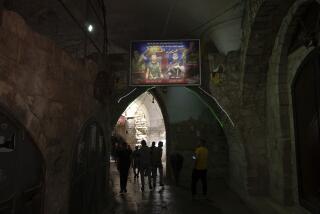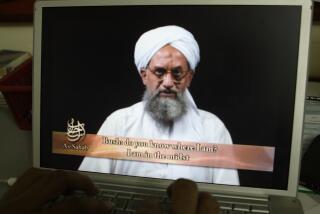Bin Laden’s top lieutenants at heart of al-Qaida
WASHINGTON — When Osama bin Laden issued his chilling warnings Sunday in footage videotaped from the mouth of a cave, Americans didn’t just see enemy No. 1. In the men seated beside bin Laden, they also saw the brains behind the al-Qaida network and, possibly, its heirs apparent.
Top lieutenants Ayman al-Zawahri and Mohammed Atef, both former members of a radical Egyptian Islamic Jihad group with a long legacy of terror, are said by authorities to have played roles in the attacks Sept. 11 on the World Trade Center and the Pentagon.
They also are as much at the heart of al-Qaida as bin Laden himself.
The two men, both linked to the 1998 U.S. Embassy bombings in Africa, are considered architects of some of the world’s most notorious acts of terrorism, going back to the assassination in 1981 of President Anwar el Sadat of Egypt.
They and bin Laden form a trio that has been nearly inseparable for 10 years, drawing plans for an extremist Islamic ideology they hope will change the world.
“It is no coincidence that the chief lieutenants are from Egypt and that Osama bin Laden is from Saudi Arabia,” said Ruhi Ramazani, a former Middle East adviser to the White House and professor emeritus of government and foreign affairs at the University of Virginia. “For years, these countries have been the cradles of some of the most radical interpretations of Islam.”
The union of the Egyptian and Afghan terror networks was never as plain as at the wedding last January of Atef’s daughter and bin Laden’s son. The wedding took place in the southern Afghan city of Kandahar, where al-Zawahri appeared as the guest of honor.
On Sunday, the world saw the three men together, with bin Laden wearing a camouflage jacket over traditional Arab robes. Beside him was a long rifle, his two closest deputies and a spokesman for al-Qaida, Suleiman Abu Gheit.
Al-Zawahri spoke briefly on the tape, saying, “America is the head of criminals by creating this Israel, this continuous crime for 50 years. The Muslim nation shall not accept this crime.” But the most haunting message came from bin Laden himself.
“America has been filled with horror from north to south and east to west, and thanks be to God,” bin Laden said. “What America is tasting now is only a copy of what we have tasted.”
Attorney General John Ashcroft said the tape showed the world “the face of evil.” Investigators were closely reviewing the images of al-Zawahri, Atef and bin Laden yesterday to see whether any of the men was using the television exposure to send coded signals to their followers for further action.
Ties among the three men reach back a decade. A federal prosecutor, in outlining the case against all three for the embassy bombings, said earlier this year that bin Laden crafted his ideology with al-Zawahri and Atef in the late 1980s as the Afghan war with the Soviet Union was winding down.
“Bin Laden wanted to export jihad, and he wanted to take the group that had been collected in Afghanistan and he wanted to form a group that would reach out and fulfill his dream, his view of how he thought the world should work,” Assistant U.S. Attorney Kenneth Karas said.
“So he formed this organization with two other people - Ayman al-Zawahri and Mohammed Atef.”
Atef, a 57-year-old former Egyptian policeman, is the head of al-Qaida’s military committee and is believed to have given the final order for last month’s attacks.
British Prime Minister Tony Blair, while not mentioning Atef by name, referred to him in documents released Sunday as “one of bin Laden’s closest and most senior associates [who] was responsible for the detailed planning” of the operation.
Also mentioned prominently in the British government document is al-Zawahri, 50, a surgeon who comes from a middle-class Egyptian family of scholars. Called the “doctor” within the al-Qaida organization, al-Zawahri is bin Laden’s personal physician and is considered the chief ideologue for the terrorist network.
Al-Zawahri, as bin Laden’s right-hand man, is involved in all levels of al-Qaida planning, according to federal prosecutors who secured an indictment of him for the 1998 embassy bombing cases. But his chief role is providing an intellectual edge for bin Laden, delivering sermons and preaching anti-American messages at al-Qaida camps.
“Egyptian Islamic Jihad has, in effect, merged with al-Qaida,” said the British document, called a Bill of Particulars.
Federal investigators noted that Mohamed Atta, considered the leader of the terrorist cells operating in America before the Sept. 11 attack, was Egyptian and might have had ties to Egyptian Islamic Jihad. He was among the hijackers of the first plane to hit the World Trade Center.
If bin Laden is the world’s most wanted man, then al-Zawahri could well run a close second. He is under a death sentence in his native Egypt, where in 1999 a military court found him guilty of terrorist acts. The FBI has posted a $5 million reward for his arrest.
When he joined al-Qaida, he was one of the founders in 1973 of the Egyptian Islamic Jihad, the group blamed for the assassination of Sadat as well as the failed attempt on President Hosni Mubarak in 1995 .
U.S. officials also have tied Islamic Jihad to the 1993 bombing at the World Trade Center that killed six people and injured thousands.
Al-Zawahri met bin Laden while working in the Afghanistan countryside. By the late 1990s, the two men reportedly had forged close ties, with al-Zawahri by some accounts quietly running al-Qaida. In February 1998, al-Zawahri signed a declaration announcing the Islamic Front for Fighting Crusaders and Jews, with goals of attacking American targets and civilians.
After U.S. airstrikes in Afghanistan that same year, it was al-Zawahri who came forward and told the Muslim world: “The war has begun. Americans should wait for an answer.”
In charge of delivering that “answer” has been Atef, who for the past five years has operated as both the military commander and occasionally as al-Qaida’s spokesman. He told an Arab reporter in an interview two years ago that America’s power was overstated.
“They [Americans] are only human beings whose power has been exaggerated because of their huge media and the control they exert over the world’s media,” the bin Laden lieutenant is reported as saying.
Atef is depicted in federal documents as a meticulous and cunning planner, often issuing his deadly orders from his satellite phones, one of which he shared with bin Laden. The phones were mentioned frequently at the trial against four bin Laden lieutenants convicted this year, and at one point Atef’s old phone number - 873682505331 - was introduced into evidence.
Other forms of technology might be in Atef’s communications arsenal. U.S. law enforcement officials suspect he and bin Laden have used nearly unbreakable codes to send messages via the Internet to terrorist cell leaders.
Prosecutors said Atef supervises bin Laden’s terrorist training camps in Afghanistan. He also is believed to have traveled several times in the early 1990s to Somalia to provide military training to Somali tribes opposed to U.S. intervention.
In 1993, attacks on American forces in that country resulted in 18 deaths.
It is also widely believed that he guided the suicide bombers who blew up the embassies in Kenya and Tanzania in 1998, killing 224 people and injuring thousands.
Of the two lieutenants, al-Zawahri would seem the more unlikely terror king. A child of privilege, like bin Laden, al-Zawahri was raised in an affluent Cairo family. His great-uncle was the first secretary general of the Arab League.
But court records show clear links between the man who once treated the poor for free in Cairo and the planner of brutal modern-day terrorist attacks.
Investigators think that al-Zawahri traveled to California under a false name and a fake mission - raising money for widows, orphans and refugees.
In federal court in New York last October, an Egyptian-born soldier named Ali Mohammed said that al-Zawahri twice traveled to the United States in the early 1990s to raise funds for the Islamic Jihad, and, “I helped him to do this.”
More to Read
Sign up for Essential California
The most important California stories and recommendations in your inbox every morning.
You may occasionally receive promotional content from the Los Angeles Times.










